Pierre Rolland interview: the song of Rolland
Cycle Sport interviewed the La Toussuire stage winner at the start of the season and found an engaging and ambitious rider, who has the unusual distinction of having won his first professional race
Words by Edward Pickering, portraits by Richard Baybutt
Thursday July 12, 2012. This interview first appeared in Cycle Sport June 2012
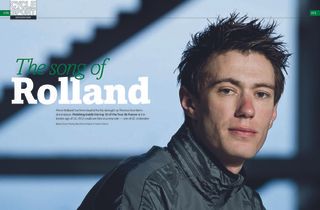
Pierre Rolland rode almost the entire Tour de France last year in the service of his Europcar team-mate Thomas Voeckler.
Through the Pyrenees and beyond, the young Frenchman was Voeckler’s constant companion, finishing at his side at Luz Ardiden and Plateau de Beille, and just a few metres behind at the Col du Galibier. Pictures of the two embracing after the finishing lines, Voeckler thanking Rolland for his support, provided some of the most memorable images of the race.
Out of 3,500 kilometres in the entire race, Rolland was cut loose for just 60, from the top of the Col du Galibier, down the other side and up Alpe d’Huez. With Voeckler faltering, Rolland was allowed to focus on his own race.
He rode cleverly, attacking before the climb so that he would have a head start, then didn’t panic when Alberto Contador came flying past. Samuel Sanchez caught him and the pair slowly closed a 45-second gap, before Rolland clinched the stage with a display of extraordinary maturity, working over the two experienced Spaniards like a cat toying with a mouse.
Get The Leadout Newsletter
The latest race content, interviews, features, reviews and expert buying guides, direct to your inbox!
French winners at Alpe d’Huez are rare enough to be extremely conspicuous. Before Rolland’s win, five-time Tour winner Bernard Hinault was the only other home winner at the most famous summit finish in cycling. Every winner at the Alpe has his name inscribed on the sign over one of the 21 hairpin bends, and Rolland’s name has gone above bend 16, along with that of Joop Zoetemelk, a winner at the Alpe in 1979.
“It was an explosion of pride and joy,” Rolland says of his emotions on the finish line. He’d been given his opportunity, and he made the most of it.
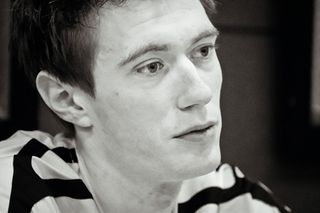
Rolland is a gangly, slightly awkward but easy-going individual, popular in the Europcar team for his sheer niceness and good manners. While Voeckler’s charisma makes him a natural centre of attention in Europcar, and extrovert Said Haddou keeps team morale up with his jokes and social energy, Rolland is treated like everybody’s favourite younger brother.
His manager Jean-Réné Bernaudeau describes him to us as bien élévé, well brought-up, and he’s a co-operative and polite interviewee. He knows what he needs to do in life, however – he’s not so well brought-up that he didn’t refuse to co-operate with Samuel Sanchez as he chased down Contador on the Alpe, in spite of the Euskaltel rider berating him. He’s got the face of a schoolboy, but he handled Sanchez and Contador like the school bully.
Rolland didn’t start the Alpe d’Huez stage thinking he would win it. He expected another day in defence of Voeckler’s yellow jersey – Voeckler’s lead was down to 15 seconds following the stage to the Col du Galibier, but a place on the podium was still possible. However, the circumstances of the day and Voeckler’s decision to chase Alberto Contador and Andy Schleck as they attacked on the Col du Télégraphe conspired to free Rolland from his responsibilities. As Voeckler faltered on the Alpe stage’s crossing of the Col du Galibier, incapable of following the leaders, Europcar had to weigh the odds of defending Voeckler’s hopeless-looking position against Rolland’s chances of winning the white jersey. Rolland was given the nod, riding away from Voeckler and towards his destiny.
“Thomas’s defaillance left me free to play my own card,” Rolland says. “He said to me, ‘It’s time for you to go, go and win the stage,’
“If I was to leave Thomas,” Rolland adds, “it wasn’t so I could finish second or third.”
The Alpe d’Huez stage was the most exciting of the entire 2012 Tour. Contador and Schleck detonated the race on the Télégraphe, and crossed the Galibier a minute clear of most of their rivals, while Voeckler spent most of the Télégraphe and Galibier alone in a fruitless chase of the attacking duo.
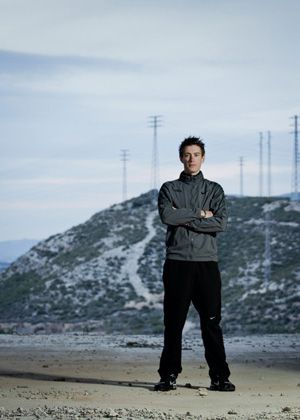
But while Contador, Schleck and Voeckler’s riding was exhilarating, it wasn’t smart. The descent of the Galibier spits the riders out onto the Col du Lautaret, whose descent down the Romanche valley is shallow and untechnical. On the day, a mild headwind blew into the Tour’s face. Perfect territory for chasing and catching escapees.
This meant that while the climbs of the Télégraphe and Galibier looked like they were shaking up the Tour, they actually weren’t. Along the valley road, the groups formed on the climb coalesced into one big front group, including Schleck and Contador. Stalemate.
There’s a small rise on the valley road just a few kilometres before the start of the climb to the Alpe in Bourg d’Oisans, and it was on this kilometre-long drag that Rolland attacked with Ryder Hesjedal.
“I wanted to start the climb in front of the others, for two reasons. I wanted to make the other teams work, so that Thomas could have an easier ride. And also, the foot of the climb is the hardest section of all and I wanted a head start,” he explains. “I got to the climb in the lead, which was already something incredible for me.”
Rolland and Hesjedal started the Alpe 40 seconds clear, giving them a chance to ride the first two-kilometre section, which averages over 10 per cent, at a less intense pace than the favourites. Behind, Evans had attacked early, and was slowly being closed down by the Schlecks – the crucial thing for Rolland was that Andy Schleck and Contador had already spent a lot of energy on their abortive escape, and were now fighting hard on the most difficult section of the climb.
But Contador wasn’t finished – he attacked the favourites, bridged to Rolland, and then rode away from the young Frenchman. Rolland could barely comprehend Contador’s climbing speed.
“He’s got a way of climbing which is particular to him,” Rolland says. “He accelerates and slows many times – it’s not always visible, but you feel it. He was doing that and I knew one thing: if I followed him I was going to blow. I responded to one attack and I responded to the second. I told myself, don't follow the third. Let him do what he has to do, ride my own climb, and see.”
Contador duly sailed away from Rolland. But salvation arrived in the form of Samuel Sanchez, who scented a second mountain stage win and enough points to win him the climbers’ jersey. The Euskaltel rider motored off an attack by Peter Velits, bridged solo to Rolland, and set his sights on Contador. Rolland correctly assessed that Sanchez had enough reasons to chase that he didn’t need to waste energy helping.
As the gap to Contador painfully eroded, Rolland’s confidence grew. Contador was looking more laboured, and halfway up the climb, just before Dutch Corner, the Spaniard started looking back. He never used to do that.
The gap was 36 seconds at seven kilometres to go, which is when Sanchez caught Rolland. A kilometre later, it was 23 seconds. 19 seconds at five to go, 15 seconds at four to go. There was a brief lull in the chase when Sanchez started asking Rolland to go through, but the Frenchmen shook his head. He knew what he was doing.
“I could see Contador all the way up. Sanchez was doing a hell of a ride, and I knew Contador had blown the day before. I was never certain we’d come back to him, but he wasn’t riding away from us any more.”
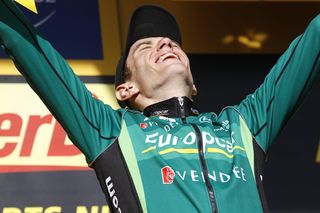
At two and a half kilometres out, the balance of power on the Alpe changed shockingly. Contador looked bad, his head nodding. Sanchez was spent. Rolland, who the cycling world had been waiting to see dropped, suddenly surged to the front. His first acceleration lost Sanchez. His second got rid of Contador. It was incredible riding.
“I didn’t think I’d be able to say that I’d attacked and dropped Contador in the Tour, but it really happened,” says Rolland."
Rolland’s finishing positions on the four summit finishes of the 2011 Tour, Luz Ardiden, Plateau de Beille, Galibier and Alpe d’Huez, were, in order, 10th, 10th, sixth and first. The conclusion to be drawn from that is that Rolland has got formidable powers of recovery and therefore can legitimately be ambitious for the general classification. Looking at the current hierarchy of French riders, if any can finish on the podium, Rolland looks the most likely.
While Rolland, along with Voeckler, made France swoon during the Tour, his tenacious fight for the Alpe stage, his assumption of the white jersey and his loyal service to the team capturing the imagination, his overall performance was no surprise to him. Rolland had been waiting for this Tour for a long time. 11th place overall didn’t come out of nowhere: Rolland had already come 22nd in the 2009 event.
Top 25 in the Tour might not normally be a headline-grabbing result, but Rolland was 22 years old when he did it – the only rider to finish ahead of him who was a comparable age that year was Roman Kreuziger, who was 23 and came ninth.
Rolland was 22nd at 22. We’ll talk about what happened when he was 23 later. And now he’s come 11th at 24. That looks suspiciously like an upward curve. Given that Contador’s results have been expunged from the record books following his backdated doping ban, Rolland has officially got a Tour top 10 to his name.
He finished 10-43 down on Cadel Evans in Paris, conceding 2-43 in the Grenoble time trial, which means he’s got eight minutes to make up if he wants to be in with a chance of winning the yellow jersey.
Compared to Evans, he actually gained time on the four summit finishes. He lost a minute and a half on the two corkscrew descents to Gap and Pinerolo, and 46 seconds in the TTT. Nothing disastrous.
But look at stage one to Mont des Alouettes: Rolland 101st at 1-55. And stage seven to Châteauroux: Rolland 117th at 3-06. On two innocuous flat stages, he lost five minutes. That’s the difference between 11th and seventh overall, or 10th and sixth if you take Contador out of the results.
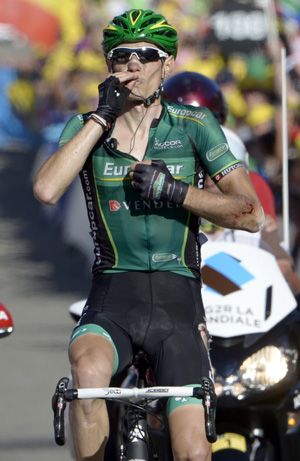
Rolland lost all that time in a stark illustration of the difference between racing the Tour as a protected rider, and racing as a domestique.
“The first day, to Mont des Alouettes, I was well-placed,” Rolland recalls.
“10 kilometres from the finish, a cap flew up into my wheel. The peloton creates wind as it moves, and it just caused the cap to fly up. I had to stop to get it out. I chased, and got back on just as the crash happened. Voila: two minutes,” he adds.
At Châteauroux Rolland again got caught behind crashes. Another three minutes were lost.
“Next year, there will be at least two riders for me in the first week. I didn’t have anybody this year,” he explains.
Put it this way: not many 24-year-olds come sixth overall in the Tour – only Contador and Andy Schleck have finished higher at that age in recent years.
The 2012 Tour route doesn’t suit Rolland very well, but he will go into it with the confidence gained from knowing that without bad luck, he’d have finished not far from the podium last year, having ridden most of the race as a climbing domestique for Thomas Voeckler. He wants to see how far he can go, but is at pains to point out that the 2011 result wasn’t such a surprise.
“The 2009 Tour was very good for me. I was 22, it was my first Tour,” he says.
He rode the race with the Bouygues Telecom team, who gained headlines with two stage wins, one from Thomas Voeckler and one from Pierrick Fedrigo. These results meant that Rolland’s 22nd overall was largely ignored.
“I think 22nd place was an exploit, it passed unnoticed, which was a little disappointing. People think I came from nowhere to finish 11th last year, but look what happened two years ago.”
While 2009 gave him the ambition of finishing higher the following year, he blew it in 2010 by mistiming his form.
“I was in great form in 2010,” Rolland says. “The problem was that it was at the wrong time.”
Rolland was eighth in the Critérium du Dauphiné Libéré, a fortnight before the Tour, but he’d peaked too soon.
“My top form lasts three weeks or a month,” he says. “I was at the top in the Dauphiné, top form in training for two weeks before the Tour, top form for the first week of the race, and then…”
He came 58th, a mediocre showing that saw him consigned to the overflowing bin of young French Tour hopes who haven’t confirmed their promise. But he’s now looking higher than 10th.
“I can say now I can finish in the top 10 of the Tour de France,” he says, then corrects himself. “No, I can do better than that. I can win a week-long stage race. I hope I can finish in the top five of the Tour. Beyond that, I don’t know. We will see.”
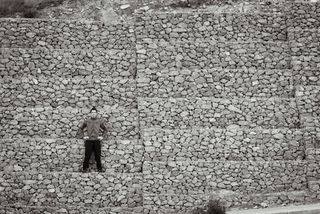
HOW PIERRE ROLLAND WON HIS FIRST RACE
There aren’t many riders who can say that they won in their first race as a professional, but Pierre Rolland is one of the rare riders who have. Although he’d ridden as a stagiare the previous season, Rolland’s professional debut for Crédit Agricole in 2007 was at the Tour of Gabon, and he won stage one.
“Don’t make too much of it!” he begs Cycle Sport. “It’s a nice anecdote, but you have to put it in context – there weren’t many pro teams there. It was nice to win, but don’t make it into something it wasn’t.”
Rolland is a homeboy – he was born in Gien, in central France, then moved to Orleans, where he still lives. He also won his first ever road race, as a junior.
“I’d been doing mountain biking, but the problem is with mountain biking is that it’s so expensive. I was breaking something on the bike every week and my parents couldn’t afford it. I got a cross bike, got some road tyres, and started racing on it. I won my first race,” he says.
After going to ride in Brittany as an Espoir, under the tutelage of former Tour yellow jersey Stéphane Heulot, Rolland signed for Crédit Agricole just after turning 20. “The plan was to turn pro in 2008, but they said there was no point in hanging around another year – I was ready,” he says.
Cycle Sport’s Tour village: All our Tour coverage, comment, analysis and banter.
Follow us on Twitter: www.twitter.com/cyclesportmag
www.twitter.com/edwardpickering

Thank you for reading 20 articles this month* Join now for unlimited access
Enjoy your first month for just £1 / $1 / €1
*Read 5 free articles per month without a subscription

Join now for unlimited access
Try first month for just £1 / $1 / €1
Edward Pickering is a writer and journalist, editor of Pro Cycling and previous deputy editor of Cycle Sport. As well as contributing to Cycling Weekly, he has also written for the likes of the New York Times. His book, The Race Against Time, saw him shortlisted for Best New Writer at the British Sports Book Awards. A self-confessed 'fair weather cyclist', Pickering also enjoys running.
-
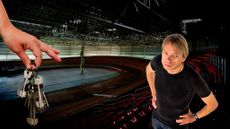 You might think racing in the UK is on a downward trajectory at the moment, but we’re not back to 2005 just yet
You might think racing in the UK is on a downward trajectory at the moment, but we’re not back to 2005 just yetWe can still fill a velodrome, which, is an improvement on CW columnist Hutch's experience
By Michael Hutchinson Published
-
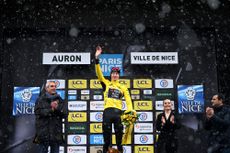 Matteo Jorgenson rules out Tour de France leadership after Jonas Vingegaard's withdrawal from Paris-Nice
Matteo Jorgenson rules out Tour de France leadership after Jonas Vingegaard's withdrawal from Paris-NiceThe American is on the cusp of a second consecutive victory at the Race to the Sun
By Tom Thewlis Published
-
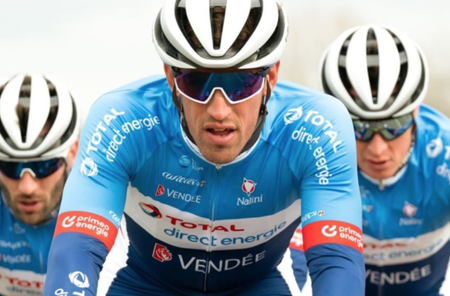 Total Direct Energie reveal new kit after title sponsor change
Total Direct Energie reveal new kit after title sponsor changeThe new kit comes on the day the team officially change their name from Direct Energie to Total Direct Energie
By Jonny Long Published
-
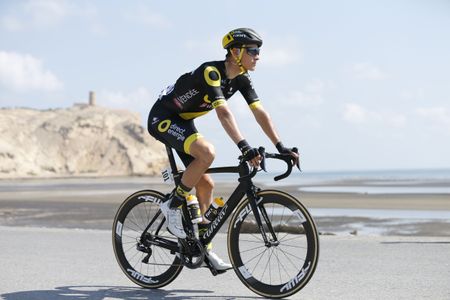 Petrol company Total to take over sponsorship Direct Energie, according to reports
Petrol company Total to take over sponsorship Direct Energie, according to reportsDirect Energie will be replaced by gas and oil giant Total as the main sponsor before Paris-Roubaix, according to French media.
By Alex Ballinger Published
-
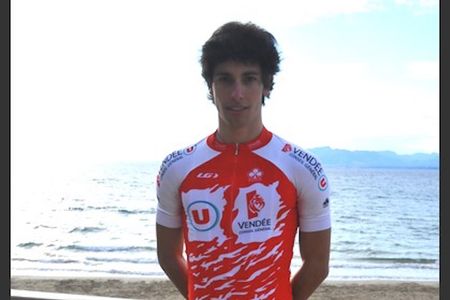 Former Europcar rider Romain Guyot, 23, dies in collision with a truck in France
Former Europcar rider Romain Guyot, 23, dies in collision with a truck in FranceRomain Guyot, 23, was killed in a collision with a truck in Roche-sur-Yon, France, on Thursday
By Stuart Clarke Published
-
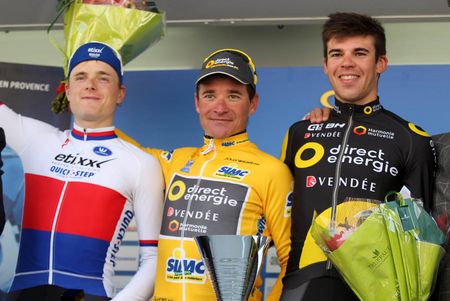 Thomas Voeckler takes first race win since 2013
Thomas Voeckler takes first race win since 2013Frenchman Thomas Voeckler wins the first edition of the Tour La Provence after claiming stage one and defending lead
By Nigel Wynn Published
-
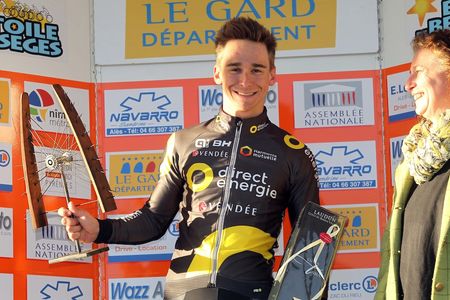 Sprinter Bryan Coquard hospitalised after training crash
Sprinter Bryan Coquard hospitalised after training crashBryan Coquard will miss the Ruta del Sol after being taken to hospital following a crash in training
By Stuart Clarke Published
-
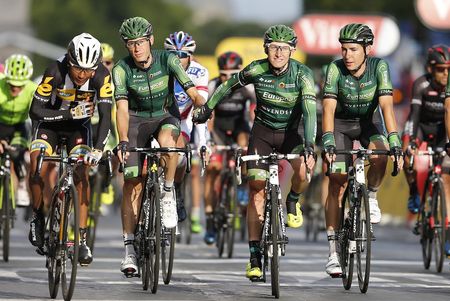 Europcar's 2016 licence issues caused by financial problems, reports suggest
Europcar's 2016 licence issues caused by financial problems, reports suggestA missed payment from bike supplier Colnago is yet to be resolved in French court, with the team's bank guarantee triggered to ensure staff are paid
By Stuart Clarke Published
-
 Europcar boss announces name of new title sponsor
Europcar boss announces name of new title sponsorDirect Energie will replace Europcar as title sponsor of the French Pro Continental team in 2016
By Stuart Clarke Published
-
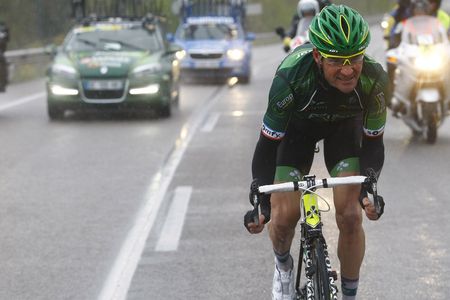 Europcar could see rider exodus after losing WorldTour licence
Europcar could see rider exodus after losing WorldTour licenceRiders free to leave French team Europcar after it loses its WorldTour licence
By Jack Elton-Walters Published